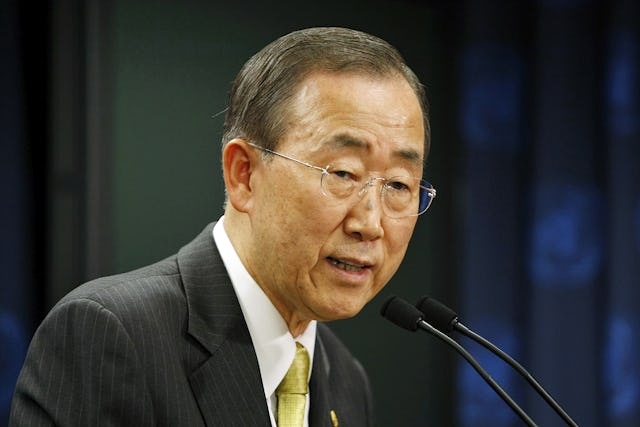Secretary general of UN releases report criticizing human rights abuses in Iran
UNITED NATIONS, United States — UN Secretary General Ban Ki-moon yesterday expressed strong criticism of Iran's human rights record, voicing concern about the use of excessive force after the recent presidential election, the harassment of women's rights activists, the ongoing execution of juveniles, and the continued persecution of minorities, including Baha'is.
In a 19-page report written specifically to address a request made last December from the UN General Assembly about human rights in Iran, Mr. Ban said there have been "negative developments" in the area of civil and political rights since 2008.
The year saw "an increase in human rights violations targeting women, university students, teachers, workers and other activist groups, particularly in the aftermath of the elections," Mr. Ban said.
"Members of various ethnic and minority groups faced harassment, violence and, in some cases, persecution," he added, noting that "a pattern of concern arises with respect to the protection of minorities, including the Baha'i community, the Arab minority in Khuzestan, the Nematollahi Sufi Muslim community, the Kurdish community, the Sunni community, the Baluchi community, and the Azeri-Turk community."
The report made specific mention of seven imprisoned Baha'i leaders who were arrested in the spring of 2008 and have since been held in Evin prison, noting that the UN High Commissioner for Human Rights has written to Iran "on numerous occasions to express concern and seek clarification" about the status of the seven.
Mr. Ban also noted that during the year reports "continued to be received about members of the Baha'i community being subjected to arbitrary detention, confiscation of property and denial of employment, government benefits, and access to higher education."
The report, which was dated 23 September 2009 but actually released yesterday, focused extensively on the government's response to post-election protests. It noted that Mr. Ban himself had on 22 June issued a statement "expressing dismay at the post-election violence, particularly the use of force against civilians, which had led to the loss of life and injuries."
That statement, the report noted, called on the authorities to respect fundamental civil and political rights, especially freedom of expression, freedom of assembly, and freedom of information. It also called for an immediate stop to the arrests, threats, and use of force. Yet, the report noted, a spokesman for the Iranian Foreign Ministry said the following day that he rejected the secretary general's statement.
Like a similar report he issued last year, Mr. Ban also took note of reports of Iran's continuing execution of juveniles, reports of the use of torture, and the oppression of women's rights activists.
"I encourage the Government of the Islamic Republic of Iran to address the concerns highlighted in the report and to continue to revise national laws, particularly the new penal code and juvenile justice laws, to ensure compliance with international human rights standards and prevent discriminatory practices against women, ethnic and religious minorities, and other minority groups," he said in the report's conclusion.
Bani Dugal, the principal representative of the Baha'i International Community to the United Nations said Mr. Ban's report was extremely welcome – and timely.
"Although Mr. Ban has praised Iran for some developments, such as government's pursuit of the redistribution of wealth and poverty reduction, overall the report is quite damning," said Ms. Dugal. "He also makes a number of suggestions about how Iran could make a constructive response, such as by opening the country to visits by special UN human rights monitors, and we sincerely hope that Iran will heed his call.
"Mr. Ban paints a grim picture of the situation in Iran, clearly indicating that the human rights situation has worsened since his report last year. Our hope, therefore, is that the UN General Assembly will again adopt a resolution this year urging Iran to live up its international human rights obligations."
To read the full report:
"The situation of human rights in the Islamic Republic of Iran"
